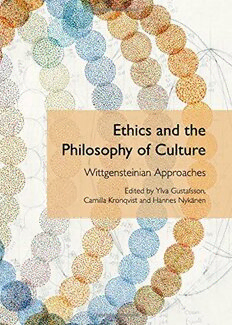
Ethics and the philosophy of culture : Wittgensteinian approaches PDF
Preview Ethics and the philosophy of culture : Wittgensteinian approaches
Ethics and the Philosophy of Culture Ethics and the Philosophy of Culture: Wittgensteinian Approaches Edited by Ylva Gustafsson, Camilla Kronqvist and Hannes Nykänen Ethics and the Philosophy of Culture: Wittgensteinian Approaches, Edited by Ylva Gustafsson, Camilla Kronqvist and Hannes Nykänen This book first published 2013 Cambridge Scholars Publishing 12 Back Chapman Street, Newcastle upon Tyne, NE6 2XX, UK British Library Cataloguing in Publication Data A catalogue record for this book is available from the British Library Copyright © 2013 by Ylva Gustafsson, Camilla Kronqvist and Hannes Nykänen and contributors All rights for this book reserved. No part of this book may be reproduced, stored in a retrieval system, or transmitted, in any form or by any means, electronic, mechanical, photocopying, recording or otherwise, without the prior permission of the copyright owner. ISBN (10): 1-4438-4322-9, ISBN (13): 978-1-4438-4322-5 CONTENTS Acknowledgements...................................................................................vii Introduction.................................................................................................1 Ylva Gustafsson, Camilla Kronqvist and Hannes Nykänen Abbreviations of Works by Wittgenstein..................................................23 Part I Language in Culture ‘Dirty’ and ‘Clean’, and the Dialectic between Facts and Practices..........26 Olli Lagerspetz Ethics and the Logic of Life......................................................................44 Alice Crary Wittgenstein, Religion, and the Rejection of Metaphysics........................74 Mikel Burley The Omniscient Being Knows...................................................................92 Don Levi Part II Culture, Ethics and the Personal Wittgenstein on Ethics, Nonsense, and Metaphysics...............................114 Duncan Richter Ethics, Wonder and the Real in Wittgenstein..........................................137 Sergio Benvenuto On Knowing Right from Wrong..............................................................160 Lars Hertzberg vi Contents Part III Ethics in Language Gender, Language and Philosophical Reconciliation: What Does Judith Butler Destabilise?.....................................................172 Pär Segerdahl Wittgenstein, Follower of Freud..............................................................212 Joel Backström Limits of Rationality: Winch, Read and Sass on Understanding Schizophrenic Thought............................................................................245 Tove Österman Forms of Attention, Attention to Form: Reading the Biography of a Holocaust Victim as an Act of Remembrance..................................264 Anniken Greve Contributors.............................................................................................282 ACKNOWLEDGEMENTS This anthology is the outcome of the conference “Wittgensteinian Approaches to Ethics and the Philosophy of Culture” that was held 26-28 March 2009. We would like to thank the contributors for taking part in the conference as well as in this anthology, and for having patience with our comments on their papers. Professor Ranjit Chatterjee was one of the speakers at the conference, but regrettably passed away in 2010 before he had finished his article. Therefore we were unfortunately not able to include it in this anthology. The editors and publisher are grateful for the permission to republish Alice Crary’s article “Ethics and the Logic of Life”, which originally appeared in SATS-Northern European Journal of Philosophy Volume 10, Issue 2, pp. 5–33, 2009. The editorial work on this volume has been conducted within the research project Westermarck and Beyond - Evolutionary Approaches to Morality and Their Critics, funded by the Kone Foundation,as well as the research projects Emotions in Dialogue and A Science of the Soul? Wittgenstein, Freud and Neuroscience in Dialogue both funded by the Academy of Finland. INTRODUCTION YLVA GUSTAFSSON, CAMILLA KRONQVIST AND HANNES NYKÄNEN The Personal and the Common-place Suppose we ask someone “Is morality personal?” Suppose further that we ask the same person “Is morality dependent on social norms?” There is a great chance that the person would reply yes to both questions without thinking that either statement contradicts the other. These two notions easily co-exist in someone’s thinking. Nevertheless, we will suggest that this kind of co-existence is ridden with more conflict than one may think of at first glance, when one tries to spell out the implications of either position. It is, for one thing, not so that my personal commitment to an idea guarantees that what I think is right is really so. However, it is also not so that the appeal to a common norm gives us any more of a guarantee to think that the norm necessarily tells us what is right. We do not solve this by saying that morality is a matter of taking personal responsibility for a common use of moral language, for then we have still not clarified to ourselves the relevant sense in which morality is personal or related to something we have in common with others. In the following discussion we will take on the questions this raises by addressing the interrelations between the concepts “culture”, “ethics” and “language” in the light of the different kinds of distinction between what is, in one or another sense common, and what is, again in one or another sense, personal. This allows us to follow up certain patterns in Wittgenstein’s thinking as well as in the contributions of this anthology. Part of our concern is to point out that it is far from clear how the concepts “common” and “personal” should be understood and that attending to the roles they have in different conversations shed light on the way in which philosophy, and especially moral philosophy, engages us as individuals, yet go beyond the clarification of what one particular individual thinks on a matter.
